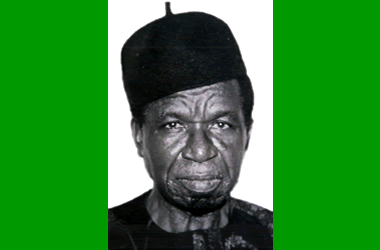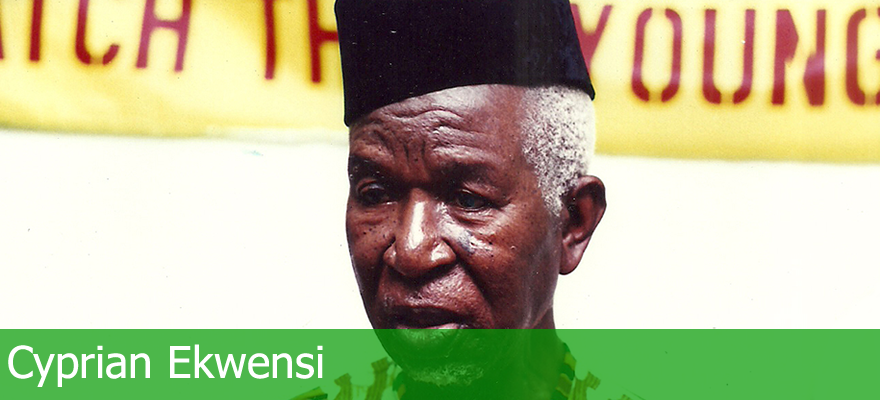Cyprian Odiatu Duaka Ekwensi was a Nigerian author, pharmacist, journalist and broadcaster. He is considered by many to be the father of modern Nigerian literature and was the second Nigerian to gain international acclaim for writing with his first novel People of the City (1954).
Early Life
Ekwensi was born in Minna in present-day Niger State on September 26, 1921. He later lived in Onitsha, Anambra State, in the eastern part of the country where his family was originally from. His father, David Anadumaka, was a storyteller and elephant hunter who influenced his writing skills. Ekwensi was educated at Government College in Ibadan, Oyo State; Achimota College in the Gold Coast (now Ghana); and the School of Forestry in Ibadan. He also studied pharmacy at Yaba Technical Institute in Lagos, the Lagos School of Pharmacy and the Chelsea School of Pharmacy of the University of London. He taught at Igbobi College and also worked as a pharmacy lecturer in Lagos. He married Eunice Anyiwo, with whom he had five children.
Career in the Civil Service
Ekwensi worked as a forestry officer from 1945 to 1947. He later became Head of Features at the Nigerian Broadcasting Corporation (NBC) which employed other prominent Nigerian literary figures such as Chinua Achebe. Following the favourable reception of his early writing, he joined the Ministry for Information during the First Republic and rose to be the director of the agency by the time of the first military coup in 1966. Because of the continuing disturbances in the Western and Northern regions during the summer of 1966, Ekwensi gave up his position and relocated his family to Enugu before the start of the Civil War. He became the chairman of the Biafran Bureau for External Publicity and was an advisor to Chukwuemeka Odumegwu-Ojukwu, leader of the Republic of Biafra.
Writing Career
Ekwensi began writing short adventure stories inspired by the wild and lonely environment he worked in as a forestry officer, some of which were published in 1947 in the book Ikolo the Wrestler and Other Ibo Tales. That same year, five of his works were published in England by Lutterworth Press as part of its African New Writing series. Another collection (this time of romance stories) was released in 1948 by a publisher in Onitsha. In 1949, Ekwensi began to read his stories for NBC shows while also writing for several Lagos newspapers.
Two years later, he began to work on his first novel People of the City while sailing to England, having won a scholarship to study pharmacy at London University. Working as a pharmacy assistant at Oldchurch Hospital, in Romford, Essex, he wrote plays which were broadcast by the British Broadcasting Corporation (BBC). He also recorded a voice-over for Cyril Frankel's movie Man of Africa (1953), which featured at the 1954 Venice Film Festival. Ekwensi's film scripts included “Nigeria Greets the Queen”, which marked Queen Elizabeth II’s first visit to Nigeria in 1956.
Ekwensi’s first written works were pamphlets, perhaps explaining the episodic nature of his novels. This stylistic signature is especially illustrated by People of the City which is a vibrant portrait of life in a West African city. It was the second major novel to be published by a Nigerian after Amos Tutuola’s Palmwine Drinkard. In 1960, he published two novellas for children: The Drummer Boy and The Passport of Mallam Ilia (which was written in 1948). Both were exercises in blending traditional themes with undisguised romanticism. The Drummer Boy, based on the life of Benjamin 'Kokoro' Aderounmu, a well-known blind minstrel and early pioneer of Jùjú music, is a powerful description of the poverty-stricken life of a street artist.
Between 1961 and 1966, Ekwensi published at least one major work every year. The most important of these included the novels Beautiful Feathers (1963) and Iska (1966) and two collections of short stories (The Rainmaker and Other Stories (1965) and Lokotown and Other Stories (1966)).
Jagua Nana, Ekwensi's most successful and widely-read novel, was published in 1961. It returned to the setting of People of the City and was centred on the character of Jagua, a courtesan with a love for expensive things who leaves her husband to work as a prostitute in a city and falls in love with a teacher. The book explored the conflict between traditional and modern urban Africa. It was vehemently attacked by the Catholic and Anglican churches for its sexually explicit language and was banned in several schools. An application to film the book by an Italian movie company was also rejected by the Nigerian parliament. A sequel titled Jagua Nana's Daughter was published in 1987. Burning Grass (1961) is a collection of vignettes depicting the life of a pastoral Fulani family; Ekwensi based the novel and the characters on a family with whom he had previously lived. Among his later works were Divided We Stand (1980), Motherless Baby (1980), Restless City and Christmas Gold (1975), Behind the Convent Wall (1987), and Gone to Mecca (1991).
Ekwensi also wrote hundreds of short stories, radio and television scripts. He also published a number of works for children such as The Leopard's Claw (1950), An African Night's Entertainment (1962) and Samankwe and the Highway Robbers(1975). His last published work was a collection of short stories titled Cash on Delivery (2007).
Awards
Ekwensi was awarded the Dag Hammarskjöld International Prize in Literature in 1969, chiefly in recognition of the success ofJagua Nana. In 2006, he became a fellow of the Nigerian Academy of Letters. The Association of Nigerian Authors (ANA) awarded him a posthumous medal of honour shortly after his death.
Death
Ekwensi died on November 4, 2007 at the Niger Foundation in Enugu, where he had undergone an operation for an undisclosed ailment.
Sources


